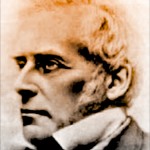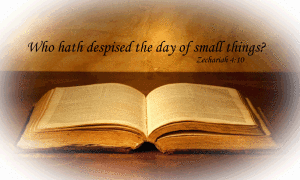Based J. N. Darby: The Church – the House and the Body – Collected Writings Volume 14 (Ecclesiastical 3) p 91
 The word ‘church’ means different things to different people:
The word ‘church’ means different things to different people:
- The Established Church (in Britain the Church of England)
- Those who are enrolled members by baptism etc.
- The buildings
- What is being built spiritually
- The clergy
- The congregation
- Christendom in general
- The body of Christ here
- What the Lord will present to Himself without spot or blemish
Baptism and the Church
No 2, above (enrolled members), is at the base of Romanism and much of Protestantism. A person becomes a Christian by being baptised into the church, whether as an adult or a young child. It is taught that one is saved because one is a member of the church, not that one is a member of the church because one is saved. Immediately after Pentecost, of course, everybody in the church were true believers. But soon the likes of Simon Magus got in, and introduced formality and other Jewish sacraments. They may have been baptised and enjoyed the privileges of the church. But they did not have eternal life, and were not members of the body of Christ. As described in the epistle of Jude, they were ‘ungodly men, turning the grace of our God into lasciviousness, and denying the only Lord God, and our Lord Jesus Christ’ (Jude v 4).
To say we are members of Christ by baptism is a falsification of the truth of God. Alas, many of the early Church fathers, such Justin Martyr, Origen, Clement and later Augustine, espoused this heresy. They may have been clear as to the Person and divinity of Christ, but they regarded the outward body as the Church, and its privileges was attributed to all who were baptised. This has continued. The (Anglican) Book of Common Prayer says ‘baptism wherein I was made a member of Christ, a child of God, and an inheritor of the kingdom of heaven’.
Much of this confusion comes about by taking what the Lord said literally when in fact He was talking figuratively. He could say, ‘I am the true vine’ (John 15:1), ‘I am the door’ (John 10:7), etc. He is not a vine nor a door. The outward act is confused with true life from God. Life and membership of Christ are by the Holy Spirit. We are born of the Spirit, and by one Spirit baptised into one body (see 1 Cor 12:13).
Man fell and was driven away from God. If there is to be a remedy, there must be new birth. We are born of God and receive the Spirit of life in Christ Jesus. As we become conscious of the sinfulness of the flesh, and say ‘O wretched man that I am!’ (Rom 7:24), we need a change of place, position or standing – reconciled to God. Baptism is that change of place.
We are baptised to His death, buried with Him unto death. Christ was raised from the dead by the glory of the Father, therefore we are alive, risen and quickened together with Him. Death has totally taken us out of our old place; we have died out of it, as Christ died out of the world we are alive with Him – walking in newness of life (see Romans 8).
The Lord’s Supper
There were many sacraments in Judaism. Some have been carried over into the public church, whereas only two are scriptural. We have looked at baptism. The other scriptural sacrament, the supper, demonstrates the unity of the body. The Lord’s supper is received in common – the assembly or Church participate. Hence we have (Eph. 4:4-5), ‘one Spirit, one body, one hope of your calling’ (belonging to the Spirit and spiritual persons, and), ‘One Lord, one faith, one baptism’ (the outward profession of faith and the recognition of Christ as Lord). Again there is a misinterpretation here: partaking of the Lord’s supper involves eating Christ’s flesh and drinking Christ’s blood. The true meaning of that is lost. (I hope to address this in a later article – see Address to his Roman Catholic brethren by a minister of the Gospel. and Second Address to his Roman Catholic brethren).
What is being Built
See Nos 3 & 4, above. People confuse what Christ builds with what man builds, physically and metaphorically. Christ said to Peter in Matthew 16:18 that He would build the Church and that the gates of hell (Satan’s deadly power) would not prevail against it. Resurrection was the proof of that. Peter’s confession, ‘Thou art the Christ, the Son of the living God’ (v. 16), was the rock on which Christ would build his church. Peter was the first stone in importance, but he was not the builder. In his epistle Peter addresses other stones coming to Jesus, ‘To whom coming, a living stone disallowed indeed of men but chosen of God and precious, ye also as living stones, are built up a spiritual house, an holy priesthood to offer up spiritual sacrifices acceptable to God by Jesus Christ’ (1 Peter 2:4). They come by faith and are built up. There are no human rules or ordinances; there is no literal building, only faith. Man’s building has no part in this. And nothing prevails against it.
Paul amplifies this, developing the doctrine of the Church as the body of Christ. But Paul does not build either. He says, ‘Ye are built upon the foundation of the apostles and prophets, Jesus Christ himself being the chief cornerstone; in whom all the building, fitly framed together, groweth unto a holy temple in the Lord’ (Eph 2:21-22). Only in Corinthians, where it is a matter of responsibility, does he write about our building. ‘Let every man take heed how he buildeth thereon’ (1 Cor 3:10). Wood, hay and stubble are not compatible with gold, silver and precious stones. Man’s work will be burned up; Christ’s work never will.
Puseyism, the high church movement, does not distinguish between the perfect building which Christ builds, where living stones grow to a holy temple in the Lord, and what man has built and continues to build. The professing church may have a good foundation, but its superstructure is questionable. It has been built of wood and stubble, which will be burned up in the day of judgment. Those who corrupt the temple of God dishonour Him by assuming that what they build has His seal of approval – in effect that God sanctions evil – what wickedness! That is why Paul writes, ‘If any man defile the temple of God, him shall God destroy; for the temple of God is holy, which temple ye are’ (1 Cor 3:17).
Paul tells us in 2 Tim 2 what our path should be. But that is another subject[*]. May we distinguish between those admitted by baptism and the body, and between the Church which Christ builds, and the sham that man builds. All man has put his hand to has failed. But God has put His hand in first, by the Man who never fails.
[*] See:

